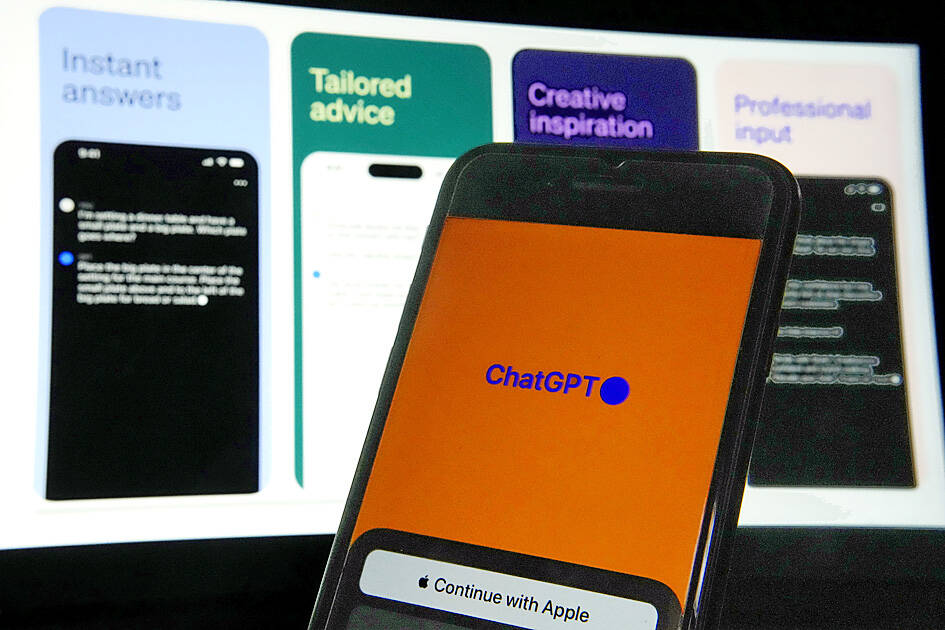Apple Inc has closed in on an agreement with OpenAI to use the start-up’s technology on the iPhone, part of a broader push to bring artificial intelligence (AI) features to its devices, people familiar with the matter said.
The two sides have been finalizing terms for a pact to use ChatGPT features in Apple’s iOS 18, the next iPhone operating system, said the people, who asked not to be identified because the situation is private.
Apple also has held talks with Alphabet Inc’s Google about licensing its Gemini chatbot. Those discussions have not led to an agreement, but are ongoing.

Photo: AP
An OpenAI accord would let Apple offer a popular chatbot as part of a flurry of new AI features that it plans to announce next month.
Still, there is no guarantee that an agreement would be announced imminently, the people said.
Representatives for Apple, OpenAI and Google declined to comment.
Apple plans to make a splash in the AI world next month, when it holds its annual Worldwide Developers Conference. As part of the push, the company would run some of its upcoming AI features via data centers equipped with its own in-house processors, Bloomberg has reported.
Last year, Apple chief executive officer Tim Cook said he personally uses OpenAI’s ChatGPT, but added that there were “a number of issues that need to be sorted.”
Cook promised that new AI features would come to Apple’s products on a “very thoughtful basis.”
On Apple’s earnings conference call early this month, Cook said that Apple would have an edge in AI.
“We believe in the transformative power and promise of AI, and we believe we have advantages that will differentiate us in this new era, including Apple’s unique combination of seamless hardware, software and services integration,” Cook said during the earnings call.
Separately, OpenAI is to announce product updates on livestream today, the company said in a post, stoking speculation about the AI giant’s next major release.
OpenAI said that it would not be launching a search product at the event.
Instead, the announcement would center around an update to ChatGPT and its GPT-4 AI model.
It has been more than a year since the company released GPT-4, its last flagship model, and a new version has been widely anticipated in the tech world.
However, the company said that it would not be launching GPT-5 — a sequel that is expected to be significantly more powerful.
In a post on X on Friday, OpenAI chief executive officer Sam Altman wrote: “not gpt-5, not a search engine, but we’ve been hard at work on some new stuff we think people will love! feels like magic to me.”

POWERING UP: PSUs for AI servers made up about 50% of Delta’s total server PSU revenue during the first three quarters of last year, the company said Power supply and electronic components maker Delta Electronics Inc (台達電) reported record-high revenue of NT$161.61 billion (US$5.11 billion) for last quarter and said it remains positive about this quarter. Last quarter’s figure was up 7.6 percent from the previous quarter and 41.51 percent higher than a year earlier, and largely in line with Yuanta Securities Investment Consulting Co’s (元大投顧) forecast of NT$160 billion. Delta’s annual revenue last year rose 31.76 percent year-on-year to NT$554.89 billion, also a record high for the company. Its strong performance reflected continued demand for high-performance power solutions and advanced liquid-cooling products used in artificial intelligence (AI) data centers,

SIZE MATTERS: TSMC started phasing out 8-inch wafer production last year, while Samsung is more aggressively retiring 8-inch capacity, TrendForce said Chipmakers are expected to raise prices of 8-inch wafers by up to 20 percent this year on concern over supply constraints as major contract chipmakers Taiwan Semiconductor Manufacturing Co (TSMC, 台積電) and Samsung Electronics Co gradually retire less advanced wafer capacity, TrendForce Corp (集邦科技) said yesterday. It is the first significant across-the-board price hike since a global semiconductor correction in 2023, the Taipei-based market researcher said in a report. Global 8-inch wafer capacity slid 0.3 percent year-on-year last year, although 8-inch wafer prices still hovered at relatively stable levels throughout the year, TrendForce said. The downward trend is expected to continue this year,

Vincent Wei led fellow Singaporean farmers around an empty Malaysian plot, laying out plans for a greenhouse and rows of leafy vegetables. What he pitched was not just space for crops, but a lifeline for growers struggling to make ends meet in a city-state with high prices and little vacant land. The future agriculture hub is part of a joint special economic zone launched last year by the two neighbors, expected to cost US$123 million and produce 10,000 tonnes of fresh produce annually. It is attracting Singaporean farmers with promises of cheaper land, labor and energy just over the border.

US actor Matthew McConaughey has filed recordings of his image and voice with US patent authorities to protect them from unauthorized usage by artificial intelligence (AI) platforms, a representative said earlier this week. Several video clips and audio recordings were registered by the commercial arm of the Just Keep Livin’ Foundation, a non-profit created by the Oscar-winning actor and his wife, Camila, according to the US Patent and Trademark Office database. Many artists are increasingly concerned about the uncontrolled use of their image via generative AI since the rollout of ChatGPT and other AI-powered tools. Several US states have adopted